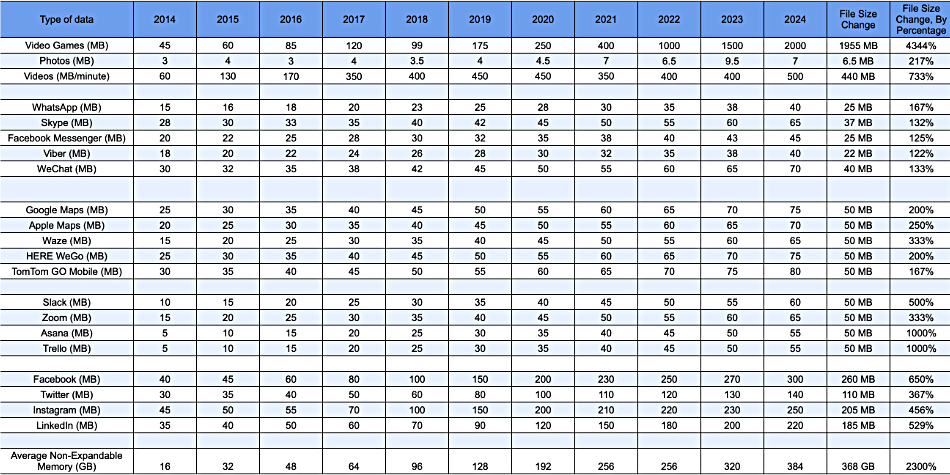Here's why your smartphone storage is disappearing so fast — popular productivity apps grew 10x in size in a decade, with Asana and Trello the major culprits, but video games remain the biggest data hogs
Smartphone users need to watch out so they don't run out of space

- Phone apps are getting bigger, and storage isn't keeping up
- Social media, games, and productivity app sizes having increased
- While apps include many more features now, they're also much bigger
If you've been wondering why your smartphone storage seems to fill up faster than ever, you're not alone. The days when 16GB of storage was more than enough are long gone, and apps that used to take up single megabytes of space now consume hundreds of MBs, sometimes even gigabytes.
A recent study by TRG Datacenters tracked the growth of popular apps over the past decade, revealing how productivity apps, communication tools, navigation apps, and games have ballooned in size.
Some have seen their storage demands increase by as much as 1000%, with certain types of data expanding even more dramatically.
From lightweight to heavyweights
Productivity apps have become essential for modern workplaces and have seen significant growth in their data requirements, and the study revealed popular workplace apps such as Asana and Trello have expanded by 1000% over the past decade.
In 2014, Asana required only 5MB of space, but by 2024, it had grown to 55MB. Similarly, Trello surged from 10MB to 100MB in the same period. These increases are attributed to the rise of remote work and the need for these apps to offer more functionality.
As project management software evolves, they have integrated features like real-time collaboration, video conferencing, and cloud storage, which naturally demand more data. Other productivity tools like Slack and Zoom have ballooned by 500% over the same period. In 2014, Slack and Zoom only consumed 10MB of space, but by 2024, they now require 60MB.

Video game file sizes have also skyrocketed - back in 2014, the average mobile video game consumed about 45MB of storage. Fast forward to 2024, and that number has exploded to 2000MB, representing a mind-boggling 4344% increase.
Are you a pro? Subscribe to our newsletter
Sign up to the TechRadar Pro newsletter to get all the top news, opinion, features and guidance your business needs to succeed!
This growth in gaming data stands out as the major culprit for vanishing phone storage, as developers push the boundaries of what mobile games can achieve, offering experiences that were once only possible on consoles and PCs.
Social media platforms, once relatively lightweight, have also seen dramatic growth in their storage demands. Facebook has increased its file size by 650%, from 50MB in 2014 to 380MB in 2024. Instagram, which is heavily focused on visual content has grown by 550%, expanding from 40MB to 260MB over the same period.
Twitter, while growing more modestly compared to other platforms, has still seen a 367% increase in its file size, rising from 30MB in 2014 to 140MB in 2024, and even LinkedIn has grown by 529%, going from 35MB in 2014 to 185MB in 2024.
The expansion isn’t limited to social media and productivity apps. Communication apps like WhatsApp and Skype have also experienced growth. In 2014, WhatsApp required only 15MB of space, but by 2024, that has increased to 40MB, a 167% increase. Similarly, Skype has grown from 20MB to 55MB, representing a 132% increase.
Also, navigation apps such as Google Maps, Apple Maps, Waze and HERE WeGo have ballooned in size by between 200% and 250%, with the increase driven by real-time traffic updates, offline maps, and integration with third-party services.
While app sizes have expanded dramatically, smartphone manufacturers have attempted to keep up by increasing the average storage capacity of their devices. In 2014, the average smartphone came with just 16GB of non-expandable memory. In 2024, this has increased to an average of 384 GB - a 2300% increase. Despite this, many users still find themselves struggling with limited storage space due to the enormous size of modern apps.
You might also like
- These are the best cloud computing services for storing your data
- Yoga Pro 7 is a reliable and efficient device for even the most demanding creative workflows
- We've rounded up the best cloud hosting providers

Efosa has been writing about technology for over 7 years, initially driven by curiosity but now fueled by a strong passion for the field. He holds both a Master's and a PhD in sciences, which provided him with a solid foundation in analytical thinking. Efosa developed a keen interest in technology policy, specifically exploring the intersection of privacy, security, and politics. His research delves into how technological advancements influence regulatory frameworks and societal norms, particularly concerning data protection and cybersecurity. Upon joining TechRadar Pro, in addition to privacy and technology policy, he is also focused on B2B security products. Efosa can be contacted at this email: udinmwenefosa@gmail.com